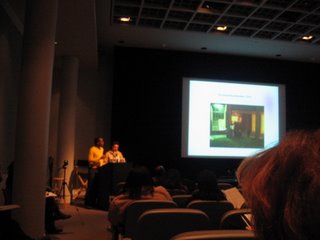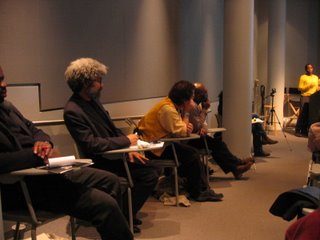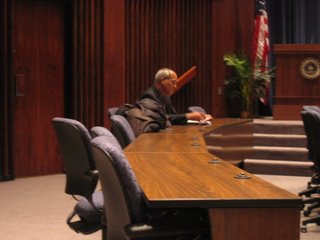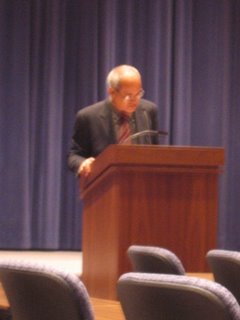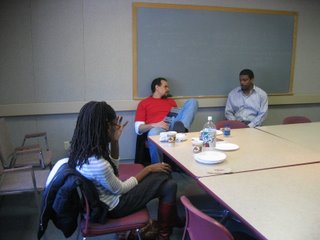Though I'm away, I thought I'd post the following petition, which I urge all J's Theater readers to review and sign. I'm also posting poet Marilyn Nelson's response, which is a model of how to respond to this kind of situation.
First, the story as reported by the
Los Angeles Times, which poet and scholar
Evie Shockley forwarded and brought to my and many others' attentions (thanks, Evie)!
***
Not the lesson they intended
Two L.A. charter school teachers lose their jobs over a planned Black
History Month presentation.
By Carla Rivera
Times Staff Writer
March 19, 2007
Administrators at a Los Angeles charter school forbade students from reciting a poem about civil rights icon Emmett Till during a Black History Month program recently, saying his story was unsuitable for an assembly of young children.
Teachers and students said the administration suggested that the Till case in which the teenager was beaten to death in Mississippi after allegedly whistling at a white woman ˜ was not fitting for a program intended to be celebratory, and that Till's actions could be viewed as sexual harassment.
The decision by Celerity Nascent Charter School leaders roiled the southwest Los Angeles campus and led to the firing of seventh-grade teacher Marisol Alba and math teacher Sean Strauss, who had signed one of several letters of protest written by the students.
The incident highlights the tenuous job security for mostly nonunion teachers in charter schools, which are publicly financed but independently run. California has more than 600 charter schools, and their ranks continue to swell. According to the California Teachers Assn., staff at fewer than 10% of charter schools are represented by unions.
"I never thought it would come to this," said Alba, who helped her students prepare the Till presentation, in which they were going to read a poem and lay flowers in a circle. "I thought the most that would happen to me [after the event was canceled] is that I'd get talked to and it would be turned into a learning and teaching experience."
School officials refused to discuss the particulars of the teachers' firings but said the issue highlights the difficulty of providing positive images for students who are often bombarded by negative cultural stereotypes.
"Our whole goal is how do we get these kids to not look at all of the bad things that could happen to them and instead focus on the process of how do we become the next surgeon or the next politician," said Celerity co-founder and Executive Director Vielka McFarlane. "We don't want to focus on how the history of the country has been checkered but on how do we dress for success, walk proud and celebrate all the accomplishments we've made."
McFarlane said details of the Till case were too graphic for an assembly that included kindergartners. The principal, Grace Canada, could not be reached for comment. McFarlane, speaking for the school, said her review of the incident did not support the teachers' allegations that Canada had used the term sexual harassment to describe Till's behavior.
But Alba said that when the principal informed the class that they could not recite their poem, she gave the example of a construction worker whistling at her as she walked down the street.
"She said that she would be offended by that and that what Emmett Till did could be considered sexual harassment," said Alba. "She used the phrase a couple of times and when I objected, she said 'OK, inappropriately whistled at a woman.' "
Many parents said their children affirmed that account. Marcia Alston, mother of a seventh-grader, called the school to say she was appalled at its interpretation of history and the treatment of the teachers. She said that in the conversation, the principal used the term "rude" to describe Till's actions.
"Mr. Strauss and Ms. Alba were excellent teachers," said Alston. "The fact that they and the students had signed a letter, I thought, was good; it was something they were passionate about and it could be used as a learning tool."
Verna Hampton, whose daughter was in Alba's homeroom and signed a letter, said she was especially offended that the incident occurred during Black History Month. Hampton said her daughter told her there was nothing offensive in the letter she signed.
"Those teachers should not have lost their jobs for standing up for what they felt was right; that sends the wrong message," Hampton said. "The kids didn't even get a chance to say goodbye."
Alba, 30, began teaching at Celerity when it opened in the fall of 2005 shortly after she received her credential. She taught social studies and science and is now looking for another job. She is writing to the school's board of trustees to request a hearing, and Strauss has drafted a letter to the board complaining that his firing was unjustified. Under the
contract signed by the teachers, they can be fired with or without cause.
In the letter terminating his employment, dated March 6, Strauss was said to have been "disparaging the school to students and parents and authorizing by physical signature a nonsupportive message to the administrative staff."
According to Alba and Strauss, individual students wrote 10 to 15 protest letters, some of which were signed by other students. Neither the teachers nor the students made copies, they said.
"The kids felt strongly about this, and because these are my students, I felt one of my jobs was to pay attention to them," said Strauss, who is earning a credential at Cal State Dominguez Hills. "It's important anywhere a teacher works that the employer be willing to listen and keep an open mind and maybe even be willing to change their mind if they learn something new."
Frank Wells, a spokesman for the California Teachers Assn., said the Celerity incident highlights the importance his group has placed on organizing charter school teachers statewide.
"This points out the vulnerability of teachers in some charters where they don't have safeguards and can be fired for any or no reason," Wells said.
Celerity Nascent (the name is derived from words meaning swift or accelerated development) opened in the Jefferson Park area last school year as a K-6 charter campus with about 330 students. Seventh grade was added this year, and there are plans to add eighth grade next year.
Of its nearly 500 students, 80% are African American and about 19% are Latino. McFarlane, who is black, said 65% of the staff members live in the neighborhood and that part of the school's mission is to create jobs in the community.
Most students are below grade level in reading when they enroll, and many have behavioral problems, school officials said. McFarlane, who worked for 14 years as a teacher and principal in the Los Angeles Unified School District, said that with its focus on project-based, "culturally responsive" learning, student achievement is rising and parents are more involved in their children's learning.
Gary L. Larson, a spokesman for the California Charter Schools Assn., said Celerity is well-run and its administrators highly regarded. He defended the school's right to judge the appropriateness of the Till presentation and to dismiss teachers.
"If they felt that it was too sensitive in nature, and as long as they are following approved procedures, they have the authority," Larson said.
Many parents agreed with the school's decision to omit the Till presentation. During February's Black History Month program, the seventh-graders' poem, based on the book "A Wreath for Emmett Till," was replaced by a reading on the civil rights struggle as a whole.
"There's no celebration in the Emmett Till story," said Stephen Weathers, president of the school's parent organization. "He was beaten for whistling at a white woman, and I don't want my daughter to know that in the fourth grade. I don't think a celebration of Black History Month is a forum for that story. It's important, but that wasn't the stage for it."
Scot Brown, associate professor of history and African American studies at UCLA, said it was unfortunate that school officials and the teachers did not find common ground.
"I'm surprised that the teachers and principal could not work out a way for students to do this presentation in a way that highlights the significance and importance of Emmett Till's loss to the larger black freedom struggle," said Brown. "It's much bigger than the acts of violence you don't want kids exposed to."
"It sounds to me that by laying a wreath and saying a poem, the students and teachers were working through the meaning of his sacrifice to the black freedom struggle, and that's very important."
carla.rivera@latimes.com
***
Re-instate Celerity Nascent Charter School Teachers' Position
In March 2007, the administration of the Celerity Nascent Charter School in Los Angeles fired seventh grade teacher Marisol Alba and math teacher Sean Strauss for their participation in events planned for the school's Black History Month program.
The school also forbade its students to read a poem, "A Wreath for Emmit Till," written by Marilyn Nelson, or to lay a wreath of flowers as part of its memorial to the slain youth.
According to an article in the L.A. Times, school officials felt that the details of Till's murder were "too graphic"* for its younger students. The article quoted Celerity co-founder and Executive Director Vielka McFarlane as saying:
We don't want to focus on how the history of the country has been checkered but on how do we dress for success, walk proud and celebrate all the accomplishments we've made.
Marisol Alba had helped her students plan the Black History Month program and was dismissed for her activity. Fellow teacher Sean Strauss signed a letter of protest drafted by the students after the program was cancelled. He was dismissed for doing so.
In 1955, Emmit Till, a 14-year old Chicago native, was visiting the town of Money, Mississippi when he allegedly whistled at a white woman. Till was African-American. The boy was abducted by two white men, pistol-whipped, shot in the head and weighted down with a 74-pound gin fan before being dumped in a nearby river. The men were acquitted by an all-white male jury. Both of his killers publicly admitted their guilt in a national article in Look magazine. The savage murder and the trial received worldwide attention and galvanized the civil rights movement in the United States.
To sign the petition, please go to:
Re-Instate Celerity Nascent Charter School Teachers Petition
*I would not that McFarlane also repeatedly suggested that Till's actions might have constituted sexual harassment, thus completely misunderstanding the history of racial and racist power relations in this country, and in particular during Mississippi and the former Confederate states during the period when he and so many others were brutally killed.***
Marilyn Nelson's ResponseFrom award-winning poet
Marilyn Nelson, via poet
Tony Hegamin, the Program Director of the Soul Mountain Retreat:
March 20, 2007
Dear Ms. McFarlane and Ms. Canada:
It has come to my attention that controversy apparently related to my book,
A Wreath for Emmett Till, has led to the firing of two of your teachers. I feel compelled to defend Marisol Alba and Sean Strauss, who were fired because they had signed one of several letters written by students to protest the summary cancellation of the seventh grade's contribution to the Black History Month program at Celerity Nascent Charter School.
From what I understand the seventh graders had planned to read a poem and create a wreath of white flowers in memory of Emmett Till, who was lynched when he was their age, for allegedly whistling at a white woman. I cannot tell from the newspaper article exactly why the seventh grade‚s wreath for Emmett Till was deemed "unfitting for a program intended to be celebratory." But one might argue that the lifelong courage of Mamie Till Mobley, Emmett's mother, who spent nearly fifty years campaigning against lynching, is well worth celebrating. One might celebrate Emmett Till's contribution to the then nascent Civil Rights Movement. One might celebrate how far we have come since the year of his death. One might--as was apparently the point of the program--celebrate Black History.
But the news coverage indicates something more troubling than a failure to honor our painful history and its triumphs. I am shocked to learn that there may truly be African American women who would consider what happened to initiate the chain of events leading to Emmett Till‚s murder in any way related to "sexual harassment." May I remind you that fifty years ago, and perhaps still now, what happened, -- if it DID happen -- was not that a man whistled at a woman, but that a BLACK man (or, actually, a 14-year old boy with a bad stutter, on the first day of his first trip without his parents, hundreds of miles from home, in a Mississippi town which surely his mother would have warned him about) allegedly whistled at a WHITE woman. I am deeply concerned that an educational administrator and the president of the P.T.A. of a school whose student body is 80% African American would so completely miss the point; that you hope to teach children to "dress for success, walk proud, and celebrate accomplishments," yet choose not to teach such a pivotal moment in our history of upward striving. Your decision to cancel the seventh grade's part of the Black History Month program suggests that you know or care little about Black History: Do you allow the students of Celerity Nascent Charter School to know that slavery existed?
Even more troubling than that initial decision, however, is your deciding, in a school in which, according to the
Los Angeles Times, "most students are below grade level in reading when they enroll, and many have behavioral problems" to fire two teachers who have turned things around to such an extent that seventh graders (a notoriously difficult age to teach) are so committed to their project that they wrote letters of protest. This whole incident reminds me of a scene in Ralph Ellison's great novel,
Invisible Man, in which the protagonist, standing in front of the statue which symbolizes the school's mission, wonders whether the teacher who is holding a veil over the head of a kneeling slave is raising the veil, or lowering it. Ms. McFarlane and Ms. Canada, might it be that you have fired teachers who were raising the veil? Might it be that you are lowering it?
I suggest, Ms. Canada and Ms. McFarlane, that your firing Ms. Alba and Mr. Strauss has taught the students of Celerity Nascent Charter School one of the most important lessons to be learned from the study of Black history: that people in power often wield that power unjustly and unwisely, and that it is our responsibility to speak truth to power and to resist injustice. Harriet Tubman, Frederick Douglass, Martin Luther King, Rosa Parks, and Mamie Till Mobley would have been proud of your students‚ passionate and clear view of your decision to cancel their program. They would have signed the students' letters of protest, too. You have accelerated the original injustice by firing teachers who encourage your students to think. Thus you commit injustice against both teachers and students.
I encourage you to reinstate Marisol Alba and Sean Strauss. With all celerity.
Yours truly,
Marilyn Nelson
East Haddam, CT
 The week before we traveled, a young scholar, Noura Wedell, delivered a presentation on Seismosis, among several other texts, at a conference, "Lyricisme et littérature," at the Centre d'études poétiques at the École nationale supérieure (ENS) Lyon. She was interested in several issues in particular, including genre, and the relation of the texts, as poems specifically, to the drawings; the politics of citation in the text, both obvious and more subtle (and the text is, specifically, a homage/hommage, to two important and little known figures, William White and Norman Pritchard, among others); and what sort of production the text "wills" itself to be, which is an open(-ended) question. I'd have loved to have been there, having only passed through Lyon with C. many years ago.
The week before we traveled, a young scholar, Noura Wedell, delivered a presentation on Seismosis, among several other texts, at a conference, "Lyricisme et littérature," at the Centre d'études poétiques at the École nationale supérieure (ENS) Lyon. She was interested in several issues in particular, including genre, and the relation of the texts, as poems specifically, to the drawings; the politics of citation in the text, both obvious and more subtle (and the text is, specifically, a homage/hommage, to two important and little known figures, William White and Norman Pritchard, among others); and what sort of production the text "wills" itself to be, which is an open(-ended) question. I'd have loved to have been there, having only passed through Lyon with C. many years ago.
 On other topics, I never watch the Oprah Winfrey Show (any more), but I intend to find out when she'll be interviewing the extremely reclusive author Cormac McCarthy (at right, from cormaccarthy.com) whose new novel, The Road, she selected for her Book Club. This is, I think, a major event in the annals of recent American literary culture, primarily because Oprah is again selecting contemporary fiction for the Book Club, after the Franzen flap and several years' hiatus, and because McCarthy, for the readers who may not be familiar with him, is one of the most reclusive and best living American fiction writers. I keep wondering what led him to agree to the interview, and how it'll proceed; he supposedly praised Oprah highly through his spokesman, but would admiration and respect for her and her book advocacy really be enough? He supposedly hasn't given more than 2 interviews in the last 40 years, and although not as extreme as Thomas Pynchon, has tended to shun the publicity circus that constitutes our broader literary scene. When I think of his works, I automatically summon up their highly poetic and fascinatingly arcane language, their consistency in terms of setting (usually the Southern Appalachia or Southwest) and plot (usually an outcast male character or characters are on the run or in pursuit of someone), the texts' relentless, forward-moving action (and comparative lack of interior characterization), and their often stomach-turning violence. McCarthy's novels--at least the several that I've read--are among the most insistently violent in American literature. Blood Meridian, or the Evening Redness in the West (1985), his masterpiece, has scenes of violence possessing the power not only to provoke horror and astonishment, but awe. (A female writer I know refused, when we were in graduate school, to read his work because it was so violent.) Suttree (1979) comes close. All The Pretty Horses (1992), another of his best works, is less violent and also more straightforward and transparent in terms of its prose style; it's probably his best known work, and the sole one to win one of the three major US literary awards (so far), the National Book Award, in 1992. But back to the interview: I would bet that Oprah will send him a list of questions in advance, they'll perhaps go back and forth so that it's well scripted, and he'll be pleasant and polite, while she'll interview in total pro mode. If she has read any of his prior books, however, she might benefit readers everywhere by pressing him on the topic of extreme violence in his work, particularly in texts such as Child of God and Blood Meridian, as well as on his rendering of female characters, his larger, apparently very bleak vision of the world, the effect of his interactions at and with the Sante Fe Institute on his writing, and his thoughts on the Coen brothers' film version of his weakest novel, This Is No Country for Old Men. Really, he ought to answer any questions she poses, since after having his work selected by her, he'll sell more copies than he ever has before.
On other topics, I never watch the Oprah Winfrey Show (any more), but I intend to find out when she'll be interviewing the extremely reclusive author Cormac McCarthy (at right, from cormaccarthy.com) whose new novel, The Road, she selected for her Book Club. This is, I think, a major event in the annals of recent American literary culture, primarily because Oprah is again selecting contemporary fiction for the Book Club, after the Franzen flap and several years' hiatus, and because McCarthy, for the readers who may not be familiar with him, is one of the most reclusive and best living American fiction writers. I keep wondering what led him to agree to the interview, and how it'll proceed; he supposedly praised Oprah highly through his spokesman, but would admiration and respect for her and her book advocacy really be enough? He supposedly hasn't given more than 2 interviews in the last 40 years, and although not as extreme as Thomas Pynchon, has tended to shun the publicity circus that constitutes our broader literary scene. When I think of his works, I automatically summon up their highly poetic and fascinatingly arcane language, their consistency in terms of setting (usually the Southern Appalachia or Southwest) and plot (usually an outcast male character or characters are on the run or in pursuit of someone), the texts' relentless, forward-moving action (and comparative lack of interior characterization), and their often stomach-turning violence. McCarthy's novels--at least the several that I've read--are among the most insistently violent in American literature. Blood Meridian, or the Evening Redness in the West (1985), his masterpiece, has scenes of violence possessing the power not only to provoke horror and astonishment, but awe. (A female writer I know refused, when we were in graduate school, to read his work because it was so violent.) Suttree (1979) comes close. All The Pretty Horses (1992), another of his best works, is less violent and also more straightforward and transparent in terms of its prose style; it's probably his best known work, and the sole one to win one of the three major US literary awards (so far), the National Book Award, in 1992. But back to the interview: I would bet that Oprah will send him a list of questions in advance, they'll perhaps go back and forth so that it's well scripted, and he'll be pleasant and polite, while she'll interview in total pro mode. If she has read any of his prior books, however, she might benefit readers everywhere by pressing him on the topic of extreme violence in his work, particularly in texts such as Child of God and Blood Meridian, as well as on his rendering of female characters, his larger, apparently very bleak vision of the world, the effect of his interactions at and with the Sante Fe Institute on his writing, and his thoughts on the Coen brothers' film version of his weakest novel, This Is No Country for Old Men. Really, he ought to answer any questions she poses, since after having his work selected by her, he'll sell more copies than he ever has before. I saw that the Tuskegee Airmen were honored yesterday in Washington. On the one hand, I don't put much stock in official events like this, which are tend to be more about the spectacle and less about the substance, and yet given what these heroes and others like them had to endure, I had to ask yet again: why did it take so damned long? Their story is one I heard often growing up. Several of the airmen were native St. Louisans, and one, Wendell O. Pruitt (at right, receiving a handshake from fellow pilot John F. Briggs, photo from ALLSTAR Learning Laboratory's Blacks in Aviation page) who died in 1945, was a legend. (The infamous Pruitt-Igoe housing project was named in part after him, as is a relative of mine.) The Preznit managed to stumble over his words, as always, and Republican Congressional leader John Boehner (Ohio) couldn't pronounce "Tuskegee" correctly to save his life, but that didn't diminish either the ceremony or its significance. As one of the airmen I heard on NPR say, their resolve, courage and remarkable record was central to the integration of the Army and US military in general, and they appreciated the government's recognition, however belated.
I saw that the Tuskegee Airmen were honored yesterday in Washington. On the one hand, I don't put much stock in official events like this, which are tend to be more about the spectacle and less about the substance, and yet given what these heroes and others like them had to endure, I had to ask yet again: why did it take so damned long? Their story is one I heard often growing up. Several of the airmen were native St. Louisans, and one, Wendell O. Pruitt (at right, receiving a handshake from fellow pilot John F. Briggs, photo from ALLSTAR Learning Laboratory's Blacks in Aviation page) who died in 1945, was a legend. (The infamous Pruitt-Igoe housing project was named in part after him, as is a relative of mine.) The Preznit managed to stumble over his words, as always, and Republican Congressional leader John Boehner (Ohio) couldn't pronounce "Tuskegee" correctly to save his life, but that didn't diminish either the ceremony or its significance. As one of the airmen I heard on NPR say, their resolve, courage and remarkable record was central to the integration of the Army and US military in general, and they appreciated the government's recognition, however belated.
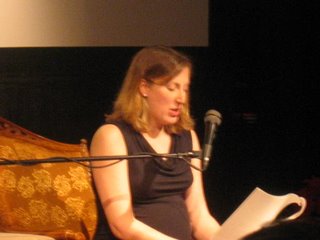
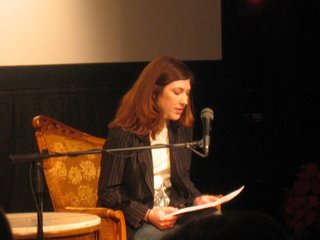
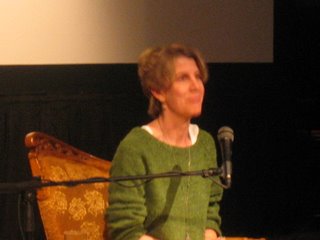














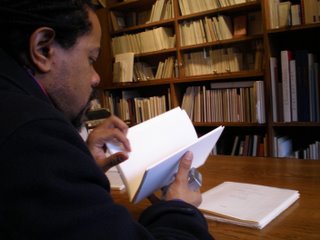

 "I speak: Portuguese, German, French, English, Spanish, Italian, Esperanto, some Russian; I read: Swedish, Dutch, Latin and Greek (but with the dictionary right next to me); I understand some German dialects; I studied the grammar of: Hungarian, Arabic, Sanskrit, Lithuanian, Polish, Tupi, Hebrew, Japanese, Czech, Finnish, Danish; I dabbled in others. But all at a very basic level. And I think that studying the spirit and the mechanism of other languages helps a great deal in the deeper understanding of the national language [of Brazil]. In general, however, I studied for pleasure, desire, distraction."
"I speak: Portuguese, German, French, English, Spanish, Italian, Esperanto, some Russian; I read: Swedish, Dutch, Latin and Greek (but with the dictionary right next to me); I understand some German dialects; I studied the grammar of: Hungarian, Arabic, Sanskrit, Lithuanian, Polish, Tupi, Hebrew, Japanese, Czech, Finnish, Danish; I dabbled in others. But all at a very basic level. And I think that studying the spirit and the mechanism of other languages helps a great deal in the deeper understanding of the national language [of Brazil]. In general, however, I studied for pleasure, desire, distraction."







